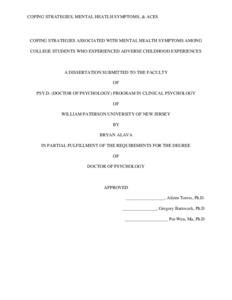Please use this identifier to cite or link to this item:
http://hdl.handle.net/20.500.12164/3326| Title: | Coping Strategies Associated with Mental Health Symptoms Among College Students who Experienced Adverse Childhood Experiences |
| Authors: | Alava, Bryan |
| Keywords: | Psychology;Clinical psychology;Adverse childhood experiences;BSI-53;Childhood trauma;College students;Coping strategies |
| Issue Date: | 2023 |
| Publisher: | William Paterson University |
| Abstract: | Adverse childhood experiences (ACEs) are associated with poor mental health outcomes, particularly in college students. For example, college students who experienced three or more ACEs are more likely to report depressive symptoms and abuse alcohol (Merians et al., 2019). Individuals who adopt adaptive coping such as positive reappraisal, seeking social support, acceptance, and planning suffer less emotional distress. Unfortunately, little is known about the different coping strategies used among college students when they have experienced ACEs. This study aimed to examine the impact ACEs have on college student’s mental health and drug use and whether the type of coping strategy used mediates the relationship between ACEs and overall distress level captured by the Global Severity Index (GSI). Undergraduate students (N = 123) who were primarily female (N = 96) and Latinx (N = 41) from a public university in the United States completed the online study. Being a child of separation or divorce was the most endorsed ACE (43.1%) and having a family member in prison and physical neglect was the least endorsed (8.9%).The results showed cumulative ACEs were significantly related to the GSI scale (R2 = .25, F(1,116) = 38.93, p = <.001) and drug use (R2 = .14, F(1,116) = 19.01, p = <.001). Furthermore, avoidance coping strategy was found to significantly mediate the relationship between cumulative ACEs and GSI score, β = .705, 95% CI [0.331, 1.199], p < .000. Lastly, results showed individuals who endorsed four or more ACEs (M = 42.08, SD = 7.79) were more likely to utilized avoidance coping strategies than individuals who endorsed three or fewer (M = 36.29, SD = 7.81); t(121), p <.001. Results suggest that experiencing ACEs leads to poorer mental health outcomes, increased drug use, and utilizing avoidance coping strategies. The results also highlight the need for continued research on coping strategies that may act as protective factors in the relationship between ACEs and mental health outcomes. |
| URI: | http://hdl.handle.net/20.500.12164/3326 |
| Appears in Collections: | Theses & Dissertations |
Files in This Item:
| File | Description | Size | Format | |
|---|---|---|---|---|
| Alava_CopingStrategies.pdf | 288.86 kB | Adobe PDF |  View/Open |
Items in DSpace are protected by copyright, with all rights reserved, unless otherwise indicated.
